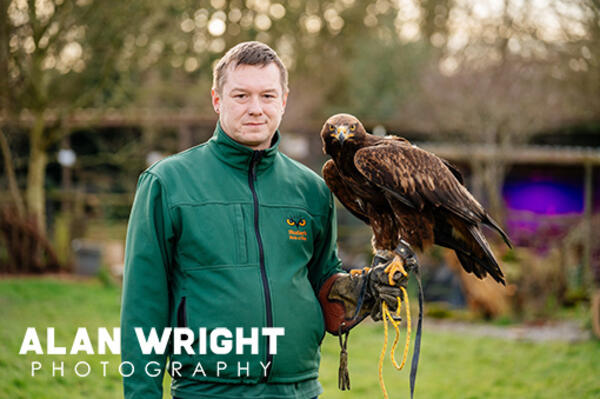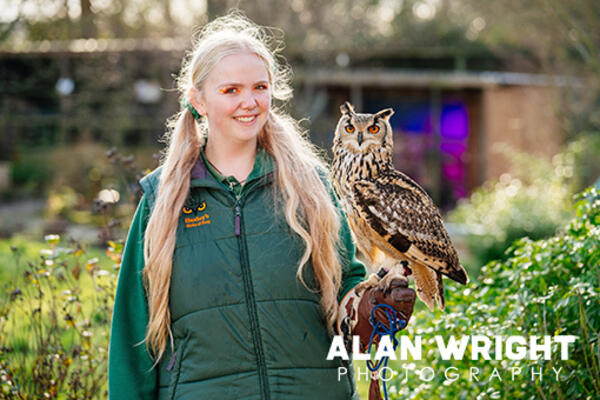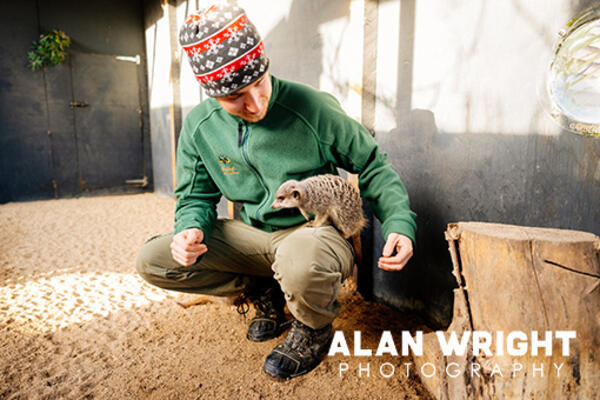HUXLEY'S BIRD OF PREY CENTRE

Published on 1st January 2025
Huxley’s Bird of Prey Centre has been established in Horsham for more than 30 years, yet remains a hidden gem for many. Three years after the passing of its founder Julian Ford, the centre is now writing a new chapter with a dedicated team of staff and volunteers. However, as AAH discovered, Huxley’s needs more public support if it’s to successfully navigate the challenges of winter…
FOUNDING FATHER
Huxley’s was founded by Julian Ford, a keen horticulturist with a passion for birds of prey. Julian opened the centre in 1993 and named it after a Eurasian eagle owl that he owned from birth. While he may not be as mobile as he once was, Huxley is still alive and will turn 48 in January, making him one of the oldest known owls in captivity anywhere in the world. Julian passed away in 2021 after a short battle with cancer, and for a while his son Shane continued his father’s legacy. However, the business is now spearheaded by a small yet passionate team led by owner/manager Luke Lloyd, with the support of more than 20 volunteers.
Luke said: ‘I volunteered at Huxley’s when I was 15 and a pupil at St Wilfrid’s School in Crawley. I got to known Julian and he inspired my love for birds of prey. After only a few months of volunteering, I brought home my first bird, a Harris hawk named Tyler. Gradually, birds became an important part of my life and I even took a baby barn owl into school in a cat basket, so I could draw it for my GCSE art project!’
‘I moved away from the area for a while but when I heard Julian was unwell, I returned to Horsham to visit him at his home behind Huxley’s, shortly before he died. He was devoted to the birds and I don’t recall him ever taking a holiday. Julian was also a horticulturist prior to working with birds, and one of his final wishes was to insulate the cactus house, home to his cacti collection. We managed to do that only days before he passed away. I returned from Cornwall to manage the centre alongside Julian’s son, but circumstances changed and I now manage the site alone, with support from an incredible team of volunteers. Coming here is a great educational experience for youngsters as the volunteers know everything about the birds!’
GOLDEN YEARS
Julian was known to be particularly fond of falcons and always provided a home for a falcon in need. However, there is much more to be found at Huxley’s. Star attractions include bald eagle Dakota, Egor the golden eagle, Coco the crested caracara, Hades the peregrine falcon and Cillian, a beautiful Chilean blue eagle (right). There is a focus on native species too, with a midday show featuring British birds including barn owls, little owls, tawny owls and kestrels. Another resident is Polaris, a snowy owl, which is not native but is known to migrate to the snowy peaks of the Scottish Highlands. Polaris can be seen flying only during the winter season, as it’s too hot for snowy owls to fly during summer.
Luke said: ‘We have flying displays at 12pm and 2pm. There’s a focus on native species at the midday session and in the afternoon we fly Frodo the eagle owl, as well as Harris hawks. Often, we fly two hawks together, which is a fantastic spectacle. Then we fly Egor the golden eagle and finish with a falcon display. We used to give all visitors the chance to wear a protective glove and hold the birds, but being passed around can cause the birds stress, so we now adopt a different approach that is more considerate of their welfare. We instead host a 15-minute experience at 1pm, during which a select number of visitors can fly and handle our resident barn owl, Casper.’
‘We also organise experiences including a Hawk Walk. We have access to nearby woodland and lead small groups on a walk, with the hawks following us, flying from tree-to-tree and occasionally coming down to the glove. We also host an Owl and Raptor afternoon for two, where visitors can hold a variety of birds including eagles, buzzards, hawks and falcons.’

CONSERVATION ROLE
There are people who feel that all forms of zoos should not be allowed. Whilst the birds at Huxley’s have been bred in captivity, not captured in the wild, there will always be concerns about animal welfare at attractions such as Huxley’s. As animal lovers first and foremost, the welfare of the birds is not lost on the staff and volunteers…
Luke said: ‘I understand why some people don’t agree with any form of zoo and believe all animals should live freely in the wild. I agree with them, but until we stop interfering with nature and sacrificing habitats for economic development, zoos will continue to play an important role in conservation, particularly for animals endangered in the wild. In the UK, conservation efforts have contributed to the population growth of birds such as the white-tailed sea eagle, which have been persecuted for centuries by landowners protecting livestock, even though their diet consists mostly of fish. Red kites and ospreys have enjoyed a resurgence too, but we have lost other species through persecution, including the eagle owl. Today’s laws offer wildlife better protection, but centres such as ours still educate people. We also help with conservation efforts, contributing, for example, to a breeding plan run by the European Association of Zoos and Aquaria (EAZA) to help save the Chaco owl, which is a species in sharp decline.’
‘Having said all of that, we know the size of the site doesn’t allow much room for flight, particularly for the bigger eagles. They don’t have much lift space, so it is difficult for them to soar to greater heights. Egor, one of our golden eagles, has been great and always looks to achieve more height, but it’s harder for our Chilean blue. In future, we hope to build two towers at opposite ends of the site, to allow them to fly between higher points.’
‘We also need to carefully consider the number of birds at the centre. Perhaps in the past, we’ve been guilty of providing a home for any bird that needed it, but if you have 30 falcons, you can’t fly them all and spending days tethered down is not much of a life at all.’

MEERKAT MANOR
As well as birds of prey, there are additional attractions at Huxley’s, including meerkats. Luke has friends at a zoo in Cornwall where a number of meerkats had been separated from the main social group. In need of a new home, he brought them to diversify Huxley’s offering. However, Luke and the volunteers need support to make further improvements and continue into the future. They have set-up a fundraising page (see end of the article) to raise awareness and keep the centre open through winter.
Liz Hughson, Volunteer Fundraising Manager, said: ‘For the last few years, we have struggled with finances during the winter. We are busy in the spring and summer and that helps us return to a more stable financial footing, but during the colder months we see fewer visitors and yet still need to feed and shelter the birds. The money only goes one way and it becomes a vicious circle. Since July, we have been registered as an official charity, which will help us apply for grants, and we hope that gift aid supplements upon admission will generate additional income to see us through the more difficult times of year. Since Luke became sole manager, the centre has had better direction. We’ve brought in the meerkats, updated some bird houses, introduced a newsletter to email subscribers, while tickets and experiences can now be booked online. This year, we increased our visitor numbers by about 500, so we’re going in the right direction and hopefully the future for the team and the birds at Huxley’s is looking brighter.’
WORDS: Ben Morris /PHOTOS: Alan Wright
Further information: Visit Huxley’s at Hillier Garden Centre, Brighton Road, Horsham, RH13 6QA or visit https://www.huxleysbop.co.uk


